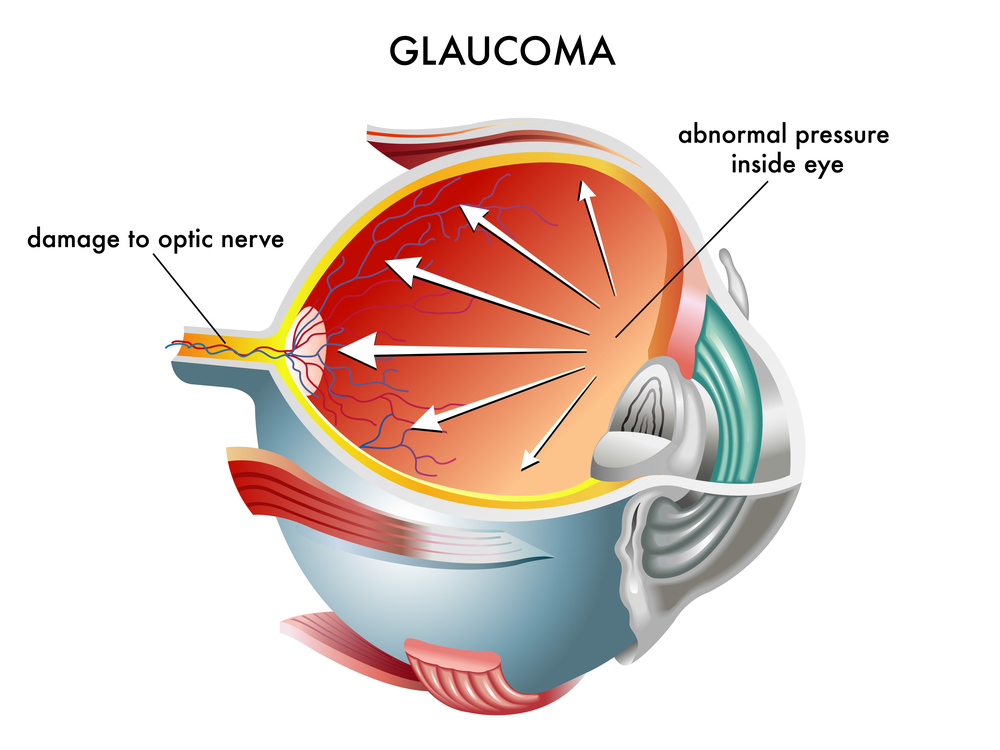The Houston glaucoma specialists at Berkeley Eye Center provide our patients with the latest and most effective medical, laser, and surgical glaucoma treatments.
Glaucoma is a leading cause of preventable blindness in the U.S. Its symptoms develop slowly over time; most people don’t realize they have glaucoma until it begins to affect their vision. Left untreated, glaucoma can lead to serious vision impairment and even blindness.
What Is Glaucoma?

When the aqueous fluid within your eye doesn’t drain properly, it can back up within the eye. This growing volume of trapped fluid gradually increases the intraocular pressure within the eye. Over time, this pressure can cause damage to the optic nerve. Glaucoma is the name of the medical conditions that result from this damage.
Anyone can develop glaucoma, but certain groups are more high risk than others: Americans of African and Latino descent over the age of 40, diabetics, anyone over the age of 60, and those with a family history of glaucoma should get a comprehensive vision exam at least once every two years.
Types of Glaucoma
There are many different types of glaucoma, including:
Open-Angle Glaucoma: Also known as primary or chronic glaucoma, this is the most common form of the disease and accounts for approximately 90% of cases, according to the Glaucoma Research Foundation. This form is caused by the slow clogging of drainage canals that results in increase pressure in the eye. It develops slowly and is lifelong condition, often with symptoms and damage that are not noticed without a comprehensive eye exam.
Angle-Closure Glaucoma: A less-common form of the disease, this is also sometimes called acute or narrow-angle glaucoma. This type of glaucoma is related to blocked drainage canals, which result in a sudden increase in intraocular pressure. Acute glaucoma develops rapidly, demands immediate medical attention and has very noticeable symptoms and damage.
Normal-Tension Glaucoma: Also known as low tension or normal-pressure glaucoma, this form of glaucoma can happen even when the intraocular pressure (IOP) of the fluid within the eye doesn’t exceed the normal pressure range. Normal-tension glaucoma tends to progress slower than other types of glaucoma. Loss of your peripheral, or side, vision is often one of the first signs of normal-tension glaucoma.
Symptoms of Glaucoma
In its earliest stages, a patient may not experience any symptoms of glaucoma. However, as the disease progresses, patients may begin to experience some of the following symptoms:
- Gradual loss of peripheral or side vision
- Sudden blurred or hazy vision
- Sudden eye pain in or behind the eyeball
- Red eyes
- Headaches accompanied by nausea or vomiting
- Blurred vision
- The appearance of rainbows and halos around lights
- Tunnel vision
If you begin to experience the symptoms of glaucoma, it’s important that you schedule an appointment with an ophthalmologist as soon as possible.
Eye Tests to Screen for Glaucoma
At Berkeley Eye Center, every comprehensive eye exam includes measurement of the eye pressure and examination of the optic nerve. Some of the tests we perform to screen for glaucoma (and other eye problems) include:
- Dilated eye exam – Drops are placed in the eyes to widen, or dilate, the pupils. Special magnifying lens are used to examine the optic nerve and retina for signs of damage and other problems.
- Visual acuity test – To determine how well you see at various distances.
- Visual field test – To measure your peripheral vision.
- Tonometry – This test uses an instrument designed to measure the pressure inside the eye.
- Pachymetry – This test uses ultrasonic scanning to measure the thickness of the cornea.
- Imaging – If you’ve already been diagnosed with glaucoma, the eye doctor will take photographs and imaging scans of the optic nerves to help track the progression of the disease.
If the symptoms are severe enough, your ophthalmologist may refer you to see one of our Houston glaucoma specialists.
What Is a Glaucoma Specialist?
If the glaucoma has progressed to a more advanced stage, your eye doctor may refer you to a Houston glaucoma specialist.
A glaucoma specialist is an ophthalmologist who has undergone a program of education and training called a “glaucoma fellowship” that provides them with the specialized skills and knowledge necessary to diagnose and treat glaucoma. They have extensive experience treating patients with all forms of glaucoma at all stages of progression.
All glaucoma specialists are state certified ophthalmologists. Becoming an ophthalmologist involves completing four years of medical school along with four years of residency training and passing a state exam.
In order to earn the title of “Glaucoma Specialist,” an ophthalmologist must complete another year or two of additional specialized training in an academic (or research) environment. This additional training is called a glaucoma fellowship.
Glaucoma Treatment in Houston
Unfortunately, there are currently no cures for glaucoma. However, there are many effective ways of treating and managing the disease that can prevent and slow vision impairment and loss.
Glaucoma treatments in Houston involve relieving the pressure by draining the excessive aqueous fluid within the eye. In the early stages of the disease, medicated eye drops can be effective at lowering the pressure. Medication can also help manage the pressure. For more serious cases, special surgical procedures may be required.
Some of the advanced procedures performed by Berkeley Eye Center’s glaucoma specialists include:
- Laser trabeculoplasty – A procedure that uses a laser to improve function of your natural drain.
- Trabeculectomy – A conventional surgical procedure that creates a filter to improve outflow out of the eye.
- Tube shunt surgery – An implant that shunts fluid out of the eye to go around the blockage that is causing high pressure.
- Xen gel stent – A smaller tube to reroute fluid out of the eye.
- Goniotomy/Canaloplasty – A minimally invasive procedure to increase outflow using the patient’s natural drainage system.
- Durysta – A dissolvable implant that releases medication in the eye.
Get Help from the Houston Glaucoma Specialists at Berkeley Eye Center
Berkeley Eye Center has been protecting and preserving the vision of patients all over the Houston area for more than 60 years. We’re recognized as one of Texas’ most established comprehensive eye care facilities. Our board certified and fellowship-trained Houston glaucoma specialists are skilled in the latest techniques of glaucoma management and have helped hundreds of Houstonians minimize the effects of their disease.
Click here to read about our Glaucoma Specialist Dr. Eunice Yook
If you’ve noticed changes in your vision, or if it’s been a while since you’ve seen an eye doctor, call Berkeley Eye Center today to schedule an appointment with a Houston eye doctor. With 24 clinics and optical locations located throughout the greater Houston area — including Katy and the Woodlands — there’s sure to be a Berkeley Eye Center office near you.

